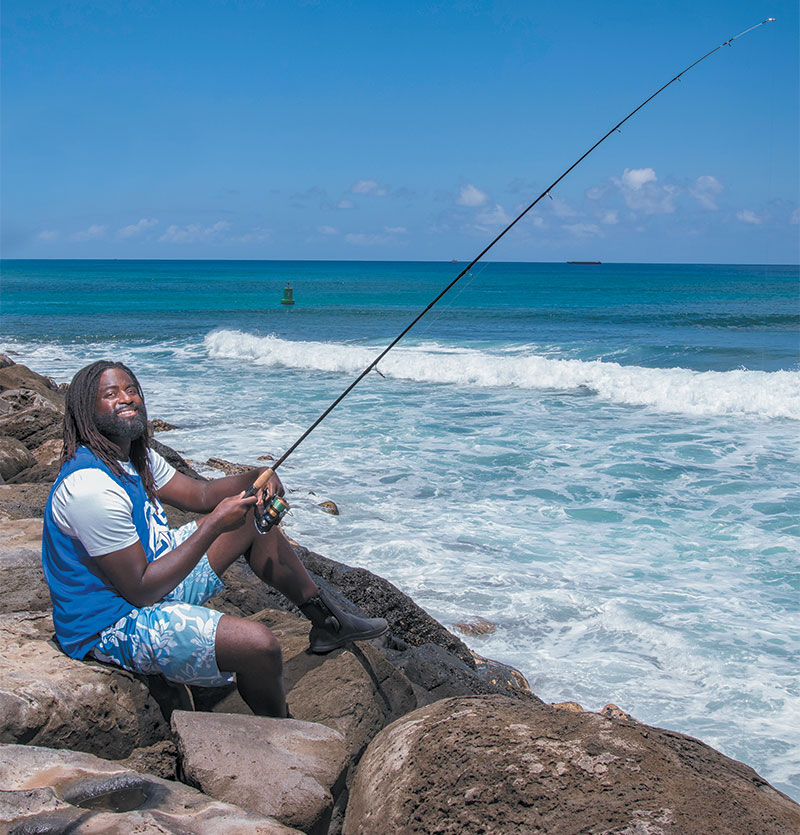Positively Hooked
With an alluring personality and a charming online show, celebrity fisherman Will Williams is proving he’s got the positive touch with viewers.
Chronicling fishing stories for the masses has been a part of the local milieu since TV shows featuring Hari Kojima and Mike Sakamoto first aired decades ago. In recent times, however, many of these celebrity fishermen have chosen a different path, wading into social media waters in order to record their adventures.
Among these is Will Williams, the star and creator of his own YouTube channel. While the avid angler isn’t the household name that Kojima (Let’s Go Fishing) and Sakamoto (Fishing Tales with Mike Sakamoto) once were, he’s definitely someone making ripples in the online fishing community with his brand of “the big fish that got away” narratives.
“I was inspired to create a channel because there were some things that would happen out on the water that I knew people wouldn’t really believe,” explains Williams. “They’d just pass it off as fish tales.”
The result is Free Will Fishing, an appeal-to-anglers-of-all-levels show that is now in its second season.
Part of the show’s charm is that Williams makes shoreline fishing so much fun. In one episode called “Plethora of Pāpios,” for example, Williams teaches his 6-year-old son Orion how to properly cast a fishing line. Upon doing so, Orion almost immediately pulls a hīnālea from the waters; the beginner’s luck continues soon after as the youngster is able to get a nenue to bite.
“Two for two!” exclaims Williams, congratulating his son for the unexpected haul as Orion’s infectious shrieks of joy are heard in the background. “Look at this kid. Oh, my goodness!”
Remarkably, Williams didn’t believe viewers would be nibbling at his show for very long.
“I thought it would be drowned out by people who were a lot more experienced, and a lot more familiar with the local ways of fishing,” he says. “But what I learned was that all of this (inexperience) is learnable.”
More importantly, he’s discovered that as long as he keeps on serving up his fishing tales with that unmistakable positive vibe of his, piscatorians will keep taking the bait by tuning in.
“The strange thing now is people actually recognize me when I go to the supermarket or the beach,” says Williams. “They’ll be like, ‘Hey, I know you!’ So yes, I’m always shocked by the attention, but I’m grateful, too.”
A native of Philadelphia, Williams’ earliest memory involves fishing with his dad at a nearby river. He was about 3 at the time.
“The first thing I pulled in was an old boot — just like in the cartoons,” he recalls with a chuckle. “But the second time around, it was a catfish.”
Williams and his family, which consists of wife Sabrina and sons Nayyir, Samir and Orion, moved to Hawa‘i in 2015.
With his background in social work, Williams immediately found a position at Hale Kipa, where he taught at-risk youth, among other things, how to interview for a job, develop their résumé and save money “so they could get their own place.” In addition, he held a part-time gig at HÄlawa Correctional Facility teaching inmates how to read and write.
Nowadays, Williams works as training specialist for Honolulu Police Department. Part of his job involves converting in-person classes into online training sessions because of the coronavirus pandemic. But a more important part requires addressing “latent biases” among officers — a sensitive topic that has received more scrutiny as of late because of the George Floyd case and the Black Lives Matter movement.
“HPD has taken a proactive approach to try to prevent some of those things that are obviously more egregious in enforcement that we’ve seen (on the mainland) and make sure those things don’t happen here,” says Williams, who was hired by HPD last December.
“We know that all human beings have some sort of bias — whether it’s racial bias, bias toward gender, bias toward economic class — that does affect some scenarios,” he continues. “That’s why there’s training, so that we can understand the science behind why there’s an inequality in some outcomes.”
For Williams, the preferred outcome is a state “of joy and positivity.” He’s found much of that in fishing, and it’s why he’s so passionate about sharing the outdoor activity with others.
“For some people, fishing is stressful and they get frustrated very easily — but not me,” he shares. “Fishing is my peace; it’s my zen. It’s that place where I go to really unwind and relax from the world.”
And thanks to his online platform, he can continue floating that message and more while reeling in viewers with his unmistakable love for the islands.
“Although I moved here to receive all of the things that make Hawai‘i an awesome place to live,” finalizes Williams, “my goal was to add to it — to make sure I had something useful to give back to Hawai‘i.”
To view Williams’ show, go to YouTube and enter “Free Will Fishing” in the search box.





